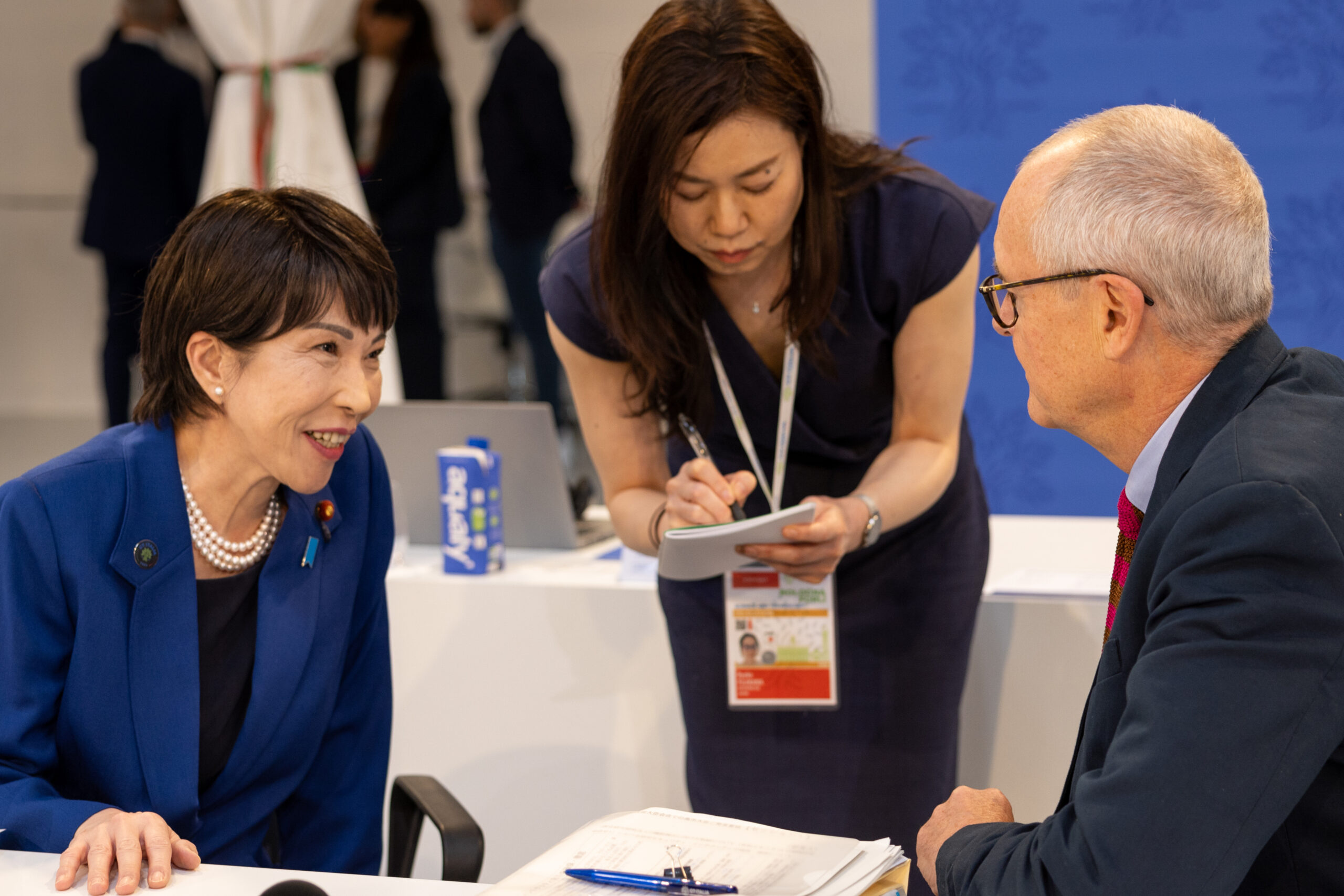Japan’s presumptive first female prime minister, Sanae Takaichi, is the face of a hard-right turn for Japanese politics. Her rise comes as the Liberal Democratic Party reels from historic electoral losses and collapsing public trust. At the same time, online hate speech and anti-immigrant misinformation are fuelling the rapid ascent of Japan’s own brand of Trump-style populism, embodied by fringe parties like Sanseitō. The LDP now appears to take advantage of this populist wave with Takaichi’s unapologetic nationalism and culture-war rhetoric. So, how far would the LDP go to hold on to power?
The Liberal Democratic Party of Japan (LDP) made history on October 4, choosing Sanae Takaichi as its first female leader, and thus likely the nation’s prime minister. While some hail it as a victory for women and progressive values, it’s anything but that. For years, Takaichi has been one of the staunchly right-wing figures within the Liberal Democratic Party (LDP): an unapologetic nationalist, a China hawk, and a vocal defender of traditional gender roles. She regularly visits Yasukuni Shrine, where convicted class-A war criminals are celebrated, and has repeatedly denied Japan’s war crimes during WW2. She has openly praised Margaret Thatcher as a role model, declaring her ambition to become Japan’s own “Iron Lady.”
This leadership election follows a historic loss for the LDP in both the upper and lower house races, which the LDP had dominated for nearly 70 years. Japanese voters simply did not care about politics, as “No matter who and what party comes into power, nothing will change” was the existing rhetoric. However, the recent slush fund scandal, a sprawling case of undeclared political funds that implicated numerous LDP lawmakers, has eroded public trust in established politicians. In the last lower house election, the LDP coalition lost its majority, securing 215 seats out of 465, a decline from its previous 279-seat majority in the lower house and the upper house elections. The LDP coalition lost its majority, securing 47 of the 125 contested seats, down from 76 in the 2022 election.
In addition to the general public’s growing frustration with the current state of Japanese politics, something far darker is flourishing online. In recent years, hate speech and misinformation targeting immigrants and foreign workers have become increasingly rampant across Japanese social media platforms. Anonymous accounts circulate fabricated stories about rising crime rates or welfare fraud by foreign residents, despite a lack of substantive evidence. Clips warning of “cultural displacement” rack up millions of views. Although there has been an influx of foreign residents, they make up barely 3% of the population. They are increasingly portrayed as invaders or barbaric people who cannot assimilate into Japanese society. The entire playbook is similar to Trump’s America First rhetoric or the Brexit movement in Britain. Japan, once thought immune to such populist rage, is now following the same script.
Amid this toxic climate flourished the Sanseitō party, which is a populist, ultra-right-wing party that combines ultra-nationalism, pseudoscience and conspiracy theories. In the past, the party has promoted COVID-19 misinformation by calling vaccines “murder weapons”. The party has also been against same-sex marriage and LGBTQ+ rights and has suggested that immigration and foreigners bring crime and receive better social welfare than native citizens. Amid dwindling salaries, record inflation and bleak future outlooks, populist parties like Sanseitō are using anti-immigrant policies to vent the voters’ dissatisfaction on easy targets. It currently has little parliamentary presence, but secured 14 seats in the last upper house election with its “Japanese First” slogan and is expanding its online presence. Rising from their influence, protests sparked by social media misinformation about an alleged influx of African migrants in the previous month forced the cancellation of a government-run exchange programme between four Japanese municipalities and African countries. Established parties, such as Nippon Ishin no Kai (The Japan Innovation Party), have also adopted tougher rhetoric on foreigners and media coverage of immigrants and their relation to public safety has surged.
Which brings us back to Takaichi. Her victory is a turning point for the LDP and Japanese politics. LDP’s struggles with declining legitimacy, coupled with the rapid growth of far-right ideologies in the country, have led the party to hope for reclaiming voters drifting toward Sanseitō-style populism by embracing ultra-right-wing ideologies. For decades, Japan’s politics have been characterised by consensus rather than confrontation. That era may now be ending. With Takaichi at the helm, the LDP appears willing to abandon its centrist posture and adopt a purer form of conservatism by prioritising cultural identity and nationalism. Following Takaichi’s victory, the leader of the LDP’s long-time coalition partner voiced unease over her anti-immigration stance and references to the Yasukuni Shrine, telling reporters that it remains unclear whether they will enter into a coalition this time around. Social minorities, from Korean and Chinese immigrants to LGBTQ+ citizens, could find themselves caught in the crossfire of a culture war that would surely intensify the divide within Japanese society.
Of course, Japan’s ethnic homogeneity makes it harder for overseas nationals to adapt to Japanese norms and standards. Nonetheless, Japan should embrace globalisation as the population continues to dwindle due to a low birthrate. Japan does not need further social division; instead, it should establish services such as language and cultural exchange programs to welcome overseas nationals and facilitate their better assimilation into Japanese society, thereby increasing Japan’s economic activity. A digital landscape saturated with misinformation and a ruling party now choosing to ride the populist wave rather than resisting it won’t make Japan stronger. It simply exposes how willing the LDP is to trade their core principles for short-term political gain. The question, then, is no longer whether Japan is shifting right, but how far the LDP is willing to go to hold onto power.
Daiki Sato is an undergraduate student pursuing a dual degree in Asia-Pacific Affairs and Global Liberal Arts at the Australian National University and Ritsumeikan University, with international experience spanning California, Japan, and Australia. He has served as a resident mentor for international students and is a former intern of the Australian Institute of International Affairs National Office.
This article is published under a Creative Commons License and may be republished with attribution.





